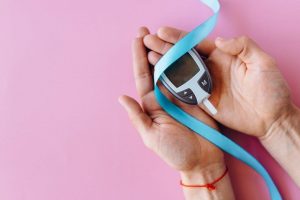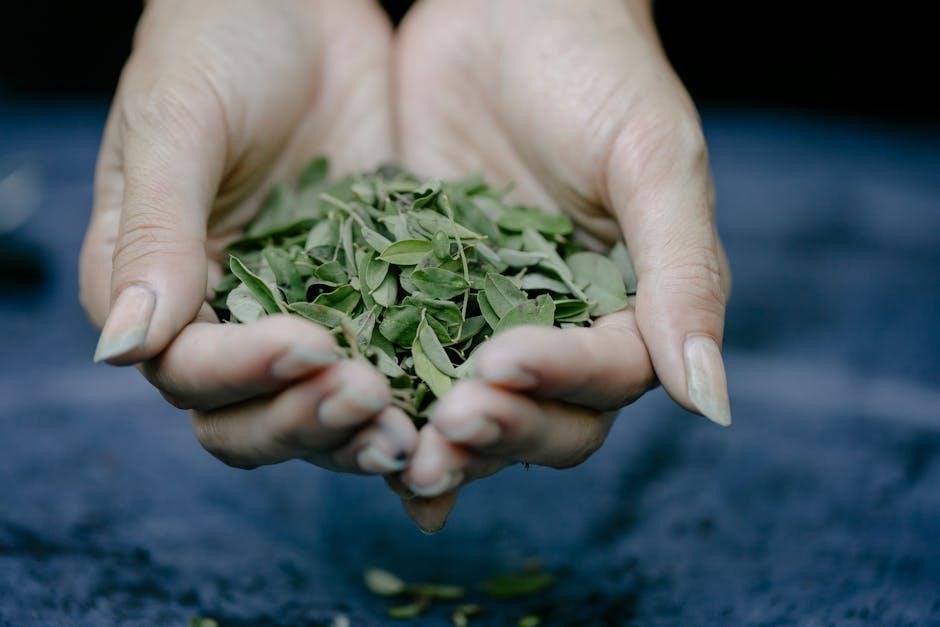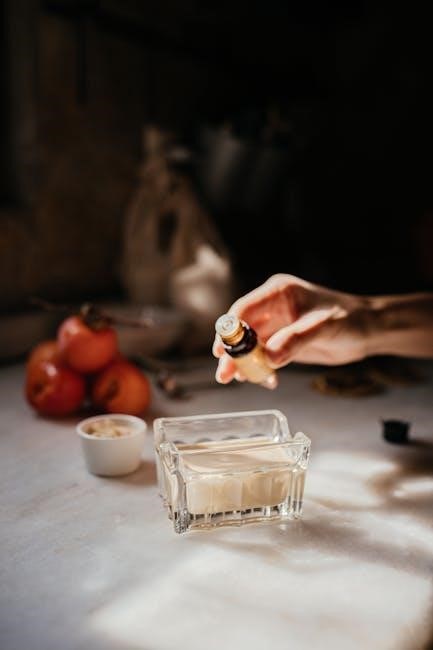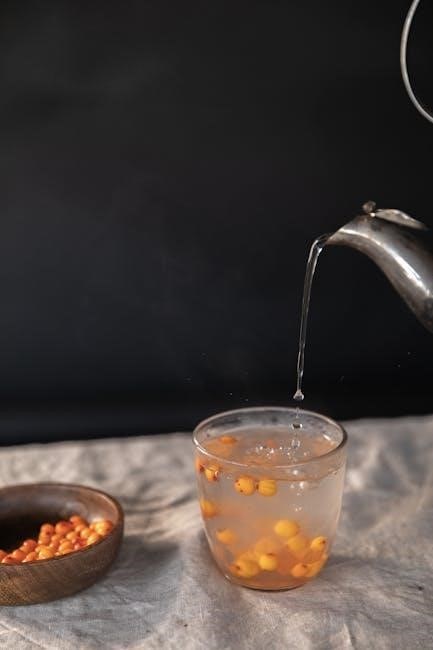nutrition and wound healing pdf

Nutrition plays a critical role in wound healing, influencing the speed and effectiveness of recovery. Proper dietary intake of protein, vitamins, and minerals supports tissue repair and immune function, while malnutrition can delay healing and increase infection risk.

Key Nutrients for Wound Healing
Protein, vitamin C, vitamin A, zinc, and iron are essential for wound healing. Protein aids tissue repair, while vitamins C and A support collagen synthesis and immune function. Zinc and iron promote cellular repair and oxygen delivery.
2.1; Macronutrients: Protein, Carbohydrates, and Fats
Macronutrients—protein, carbohydrates, and fats—are foundational for wound healing. Protein is essential for tissue repair, with recommendations of 20-30 grams per meal to support collagen synthesis and muscle preservation. Carbohydrates provide energy for cellular processes, preventing muscle breakdown and supporting the healing cascade. Fats, particularly omega-3 fatty acids, reduce inflammation and promote tissue repair. A balanced intake of these macronutrients ensures optimal wound healing outcomes.

- Protein: Repairs tissues and supports immune function, with higher needs during healing.
- Carbohydrates: Provide energy for repair processes, preventing muscle breakdown.
- Fats: Reduce inflammation and support cellular health, especially omega-3s.
Adequate macronutrient intake accelerates recovery and strengthens overall health during wound healing.
2.2. Micronutrients: Vitamins and Minerals
Micronutrients, including vitamins and minerals, play a vital role in wound healing by supporting cellular repair and immune function. Vitamin C is essential for collagen synthesis, while vitamin A enhances immune response and tissue strength. Vitamin E acts as an antioxidant, protecting cells from damage. Zinc is crucial for enzyme function, wound debridement, and protein synthesis, with deficiencies often linked to delayed healing; Iron supports oxygen delivery to tissues, and vitamin D aids in inflammation regulation. These micronutrients work synergistically to promote tissue repair and prevent complications.
- Vitamin C: Essential for collagen production and tissue integrity.
- Vitamin A: Enhances immune function and wound strength.
- Zinc: Crucial for enzyme activity and tissue repair.
- Iron: Supports oxygen transport to healing tissues.
- Vitamin E: Protects cells from oxidative damage.
Adequate intake of these micronutrients is critical for optimal wound healing outcomes, as deficiencies can significantly impede the recovery process.

The Role of Hydration in Wound Healing
Hydration plays a vital role in wound healing by maintaining skin elasticity, promoting blood flow, and supporting the delivery of nutrients to damaged tissues. Proper fluid intake ensures that the body can effectively transport oxygen, nutrients, and immune cells to the wound site, facilitating repair. Even mild dehydration can impede healing by reducing blood volume and slowing down cellular processes. Additionally, hydration helps prevent the buildup of toxins, which can delay recovery and increase the risk of infection.
- Water: Essential for maintaining skin hydration and supporting cellular functions.
- Electrolytes: Crucial for maintaining fluid balance and nerve function.
- Herbal teas and broths: Provide additional fluids and nutrients without adding excessive sugar.
Adequate hydration is critical for maintaining healthy skin and supporting the healing process. Drinking enough fluids ensures that the body can efficiently repair tissues and prevent complications during wound recovery.
Importance of Nutrition in Wound Healing
Proper nutrition is essential for wound healing, providing the necessary building blocks for tissue repair and immune support. Key nutrients like protein, vitamins, and minerals promote collagen synthesis and prevent infection.
4.1. Phases of Wound Healing
Wound healing progresses through four distinct phases: hemostasis, inflammation, proliferation, and remodeling. Each phase requires specific nutritional support to optimize recovery. During hemostasis, the body stops bleeding, relying on calcium and vitamin K. The inflammatory phase involves cleaning the wound, supported by vitamin C and zinc. Proliferation focuses on tissue repair, with protein, amino acids, and zinc being crucial for collagen synthesis. Finally, the remodeling phase strengthens the new tissue, requiring continued protein and vitamin C intake. Nutritional deficiencies can disrupt this process, delaying healing. Ensuring adequate intake of calories, macronutrients, and micronutrients is vital to support these phases effectively.

Managing Chronic Wounds Through Diet
A tailored diet rich in protein, vitamins C and A, zinc, and omega-3 fatty acids supports chronic wound management. Hydration is crucial, while minimizing sugary and processed foods helps reduce inflammation and promote healing.
5.1. Specific Dietary Adjustments

Managing chronic wounds through diet requires targeted adjustments to optimize healing. Increasing protein intake is essential, as it supports tissue repair and collagen synthesis. Foods rich in lean proteins, such as poultry, fish, and legumes, are ideal. Additionally, vitamin C and vitamin A play critical roles in collagen production and immune function, with sources like citrus fruits, bell peppers, and sweet potatoes being beneficial. Zinc, found in nuts, seeds, and red meat, aids in tissue repair and immune response. Omega-3 fatty acids, present in fatty fish like salmon, help reduce inflammation. Staying hydrated is vital, as water supports cellular function and wound cleansing. Some studies suggest arginine supplements may enhance healing, though consultation with a healthcare provider is recommended. Avoiding excessive sugar and processed foods is important, as they can exacerbate inflammation and hinder recovery. A balanced and nutrient-dense diet, tailored to individual needs, is key to promoting chronic wound healing and preventing complications.

Nutritional Considerations for Diabetic Wounds
Nutritional management is crucial for individuals with diabetic wounds, as hyperglycemia can impede healing and increase infection risk. Maintaining tight blood sugar control is essential to promote wound recovery and prevent complications. A diet rich in protein is recommended to support tissue repair, with sources such as lean meats, fish, and plant-based options like legumes and tofu being ideal. Vitamin C and zinc are particularly important, as they enhance collagen synthesis and immune function. Foods high in antioxidants, such as berries and leafy greens, also play a role in reducing oxidative stress; Hydration is vital, as it helps maintain blood flow and supports the healing process. Additionally, fiber-rich foods can aid in blood sugar regulation, while avoiding high-sugar and processed foods is recommended to minimize inflammation. Consulting a dietitian to create a personalized meal plan is highly advised, as nutritional needs may vary based on the severity of the wound and individual health status. Proper nutrition, combined with regular monitoring, can significantly improve outcomes for diabetic wound healing.

The Role of Supplements in Wound Healing
Supplements can play a vital role in supporting wound healing, particularly when nutritional deficiencies exist or dietary intake is insufficient. Key nutrients such as protein, vitamin C, zinc, and arginine are often recommended to enhance the healing process. Protein supplements, for instance, are essential for tissue repair and collagen synthesis. Vitamin C is known to boost collagen production and improve wound strength, while zinc supports immune function and tissue repair. Arginine, an amino acid, has been shown to enhance blood flow and promote healing in certain individuals. Additionally, antioxidants like vitamin E and omega-3 fatty acids can reduce inflammation and oxidative stress, which are beneficial for chronic wounds. However, supplements should be tailored to individual needs and used under the guidance of a healthcare professional to avoid over-supplementation or interactions with medications. While supplements can support healing, they should complement, not replace, a balanced diet. Proper consultation and monitoring are crucial to ensure optimal outcomes.

Nutritional Assessment Tools
Nutritional assessment tools are essential for identifying malnutrition and ensuring adequate dietary support for wound healing. One commonly used tool is the Mini Nutritional Assessment (MNA), which evaluates nutritional status through questions about diet, weight loss, and physical performance; This tool helps healthcare providers identify individuals at risk of malnutrition and implement timely interventions. Other tools include the Malnutrition Universal Screening Tool (MUST) and the Patient-Generated Subjective Global Assessment (PG-SGA), which assess factors like weight loss, dietary intake, and physical function. These tools are validated and widely used in clinical settings to guide personalized nutritional care plans. Regular nutritional assessments ensure that patients with wounds receive the necessary nutrients to support healing. By identifying deficiencies early, healthcare providers can address them before they impede recovery. Nutritional assessment is a continuous process, adapting to the patient’s changing needs throughout the healing journey. Accurate and consistent use of these tools is vital for optimizing wound care outcomes and improving patient well-being.

Preventing Wound Complications with Proper Diet
A well-balanced diet plays a crucial role in preventing wound complications by ensuring the body has the necessary nutrients to support healing and avoid infections; Key nutrients like protein, vitamin C, and zinc are essential for tissue repair and immune function. Protein helps build and repair tissues, while vitamin C promotes collagen synthesis and wound strength. Zinc supports immune function and reduces the risk of infection. Additionally, staying hydrated is vital, as water helps maintain skin health and promotes healing. Foods rich in antioxidants, such as fruits and vegetables, also play a role in reducing inflammation and promoting recovery. Avoiding excessive sugar and processed foods is important, as they can lead to inflammation and slow healing. A diet rich in whole foods, lean proteins, and essential vitamins and minerals can significantly reduce the risk of wound complications. Regularly consuming foods like lean meats, fish, eggs, whole grains, and colorful vegetables ensures a steady supply of nutrients. Proper nutrition not only accelerates healing but also helps prevent chronic wounds from developing or worsening. A balanced diet is a cornerstone of effective wound care and overall health.